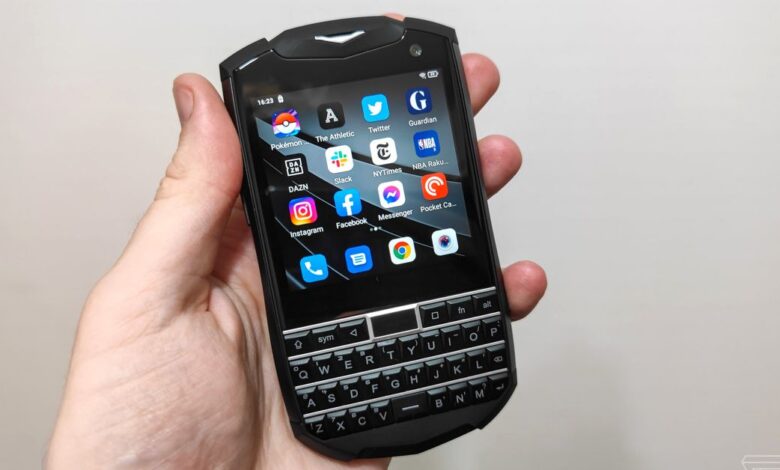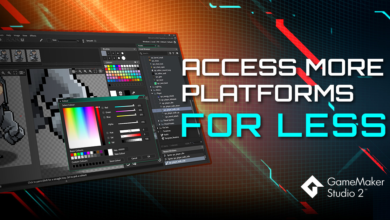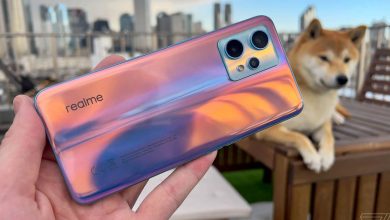The BlackBerry keyboard lives on in this new Android phone

Even though the iPhone arrived as a harbinger of doom for phones with physical keyboards well over a decade ago, the fanatical enthusiasm for BlackBerry isn’t something that just goes away completely. People loved their BlackBerry keyboards, and their relative efficiency when compared to touchscreens wasn’t really the point.
Still, the niche gets tinier by the year, and it falls on similarly tiny companies to serve it. Now we have the Titan Pocket, a new Android phone launching today on Kickstarter from Unihertz, which previously released the miniature Jelly phones and, more pertinently, another BlackBerry-esque device called the Titan back in 2019.
The Titan was like a rugged take on the BlackBerry Passport, which was a weird phone even for BlackBerry fans. Its sibling, the Pocket, keeps the rugged style but comes in much more manageable dimensions. The 3.1-inch LCD screen is actually a little smaller than a BlackBerry Classic’s, though it has a similar resolution at 716 x 720, which makes for a fairly sharp pixel density of 328 ppi.
:no_upscale()/cdn.vox-cdn.com/uploads/chorus_asset/file/22522380/IMG_20210518_162324.jpg)
Obviously, you can’t fit all that much content on a screen like this. The Gmail app only shows three emails at once, for example. But if you’re longing for the days of firing out email blasts on your Blackberry, well, the Titan Pocket shows about as much of your message as any other smartphone would when bringing up a touchscreen keyboard.
I was never a BlackBerry addict myself, so those who were may feel differently, but I think the Titan Pocket’s keyboard is pretty good. I’m way faster on a touchscreen, of course, but the keys are responsive and easy to distinguish, and the backlighting looks much better than it did on the bigger Titan. The Pocket delivers on its promise of a satisfyingly tactile typing experience.
Unfortunately, the keyboard doesn’t do much more than that. The Pocket runs a basically stock version of Android 11 that hasn’t been customized much for its form factor. There aren’t the same kind of keyboard shortcuts that BlackBerry users were used to. Pressing or holding down a letter key on the home screen just starts typing in a Google search, for example. This would still be a useful feature if not for the fact that the cursor appears in the search bar behind the first letter you typed, making it essentially useless since you’ll have to fix a typo on every single search.
And as with the larger Titan, you’ll find many examples of how Android apps don’t really know how to deal with square screens. Games are mostly out, and fullscreen video usually only plays on its side. (Then again, I suppose the BlackBerry Bold wasn’t exactly an incredible entertainment device itself.)
Accordingly, the Titan Pocket is not a powerful phone. It has a MediaTek P70 processor, 6GB of RAM, and 128GB of storage; you’ll sometimes see some lag when scrolling through Twitter and so on, but generally performance seems adequate for the kind of thing you’ll be doing on a phone like this. Other features include a microSD card slot, an IR blaster, and a headphone jack.
The standout spec is the 4,000mAh battery, which is no doubt helped by the sturdy, 16.8mm-thick design and should give the phone some pretty serious endurance considering the small screen and low-power processor. This phone’s vibe is decidedly less C-suite than an actual BlackBerry, but if you need to send emails while hiking, it could be for you.
:no_upscale()/cdn.vox-cdn.com/uploads/chorus_asset/file/22522379/ptp.jpg)
As long as you don’t also need to take stunning photos on the hike, that is, because the Titan Pocket’s single 16-megapixel camera predictably isn’t very good. It should do a reasonable job in bright conditions, like just about anything else, but the square-by-default results aren’t great for low light or moving subjects. Like my dog most of the time, as you can see above.
But hey, this is a niche device at a pretty low price. Its camera might be worse than most other phones out there, but its physical keyboard is better than all other phones out there by virtue of existing at all. Its Kickstarter pricing starts at $159 and goes up to $219, making it a potentially viable option as a second device despite its obvious limitations. Unihertz has a good record shipping crowdfunded phones, and while this one doesn’t do much for me personally, I can imagine it might for others.
Source link





